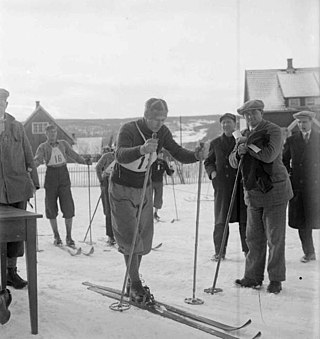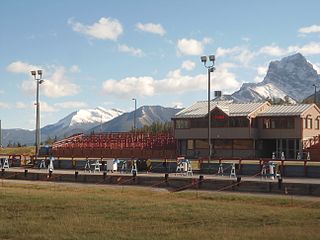See also
- Victor Thorn (1844–1930), Luxembourg politician
Viktor Thorn may refer to:

Skiing is the use of skis to glide on snow. Variations of purpose include basic transport, a recreational activity, or a competitive winter sport. Many types of competitive skiing events are recognized by the International Olympic Committee (IOC), and the International Ski Federation (FIS).

Nordic combined is a winter sport in which athletes compete in cross-country skiing and ski jumping. The Nordic combined at the Winter Olympics has been held since the first ever Winter Olympics in 1924, while the FIS Nordic Combined World Cup has been held since 1983. Many Nordic combined competitions use the Gundersen method, where placement in the ski jumping segment results in time (dis)advantages added to the contestant's total in the cross-country skiing segment.
Faure is an Occitan family name meaning blacksmith, from Latin faber. It is pronounced differently from the accented surname Fauré, as in Gabriel Fauré, French composer and organist.

Anssi Einar Koivuranta is a retired Finnish ski jumper and former Nordic combined skier, best known for winning the 2008–09 FIS Nordic Combined World Cup. He won the gold medal in the 4 × 5 km team event and a bronze medal in the 15 km Gundersen race at the 2007 FIS Nordic World Ski Championships in Sapporo. After winning a Ski Jumping World Cup competition in Innsbruck on 4 January 2014, Koivuranta became the first ever athlete in history of ski jumping to win an event in both Nordic combined and the ski jumping World Cup.
At the 1924 Winter Olympics, two cross-country skiing events were held. The 50 km competition was held on Wednesday, 30 January 1924 and the 18 km competition was held on Saturday, 2 February 1924. The events were also part of the FIS Nordic World Ski Championships as well, which would be combined until the 1980 Winter Olympics.
At the 1936 Winter Olympics, one individual Nordic combined event was contested. It was held on Wednesday, February 12, 1936 and on Thursday, February 13, 1936.
Viktor Thorn was a Norwegian nordic combined athlete who won the Nordic combined event at the Holmenkollen ski festival in 1895. For that honor, Thorn became the first winner of the Holmenkollen medal that same year.

Ole Stenen was a Norwegian Nordic skier who competed in nordic combined and cross-country skiing in the 1920s and early 1930s.
Willy Bogner may refer to:
The Sports Clubs of the Armed Forces, Physical Culture and Sports Association of the Soviet Armed Forces, also called the Sports Clubs of the Soviet Ministry of Defense or simply Armed Forces or Army were a system of departmental sports clubs and one of the largest sports societies in the USSR.
Magnar is a somewhat common forename for men in Norway. The name is known in Norway from the late 19th century. The name may be derived from the Norse word magn meaning "Strength" or possibly from the Latin name Magnus.

Canmore Nordic Centre Provincial Park is a provincial park in Alberta, Canada, located immediately west of Canmore, 105 km (65 mi) west of Calgary.

The Whistler Olympic Park is the location of the Nordic events facilities for the 2010 Winter Olympics and is located in the Madeley Creek basin in the Callaghan Valley, west of Whistler, British Columbia, Canada. The facility hosted the biathlon, cross-country skiing, Nordic combined, and ski jumping. After the Olympics will remain a public facility, complementing the extensive wilderness trails and alpine routes already in use. Three temporary stadiums were built with a capacity for 12,000 spectators each. The location is approximately 8 km from the junction of its access road with Highway 99 and 14 km from the Whistler Olympic Village.
Thorn is a surname that may refer to:

Gustav "Gustl" Müller was a German Nordic combined and cross-country skier.
Jeandel is a French surname. Notable people with the surname include:

Viktor Thorn is a Swedish cross-country skier. He competed in the 2018 Winter Olympics. On 6 April 2021, he announced his retirement from cross-country skiing.
Gąsienica is a Polish-language surname common among the Goral population of Zakopane region literally meaning "caterpillar".
Runggaldier is a surname. Notable people with the surname include: